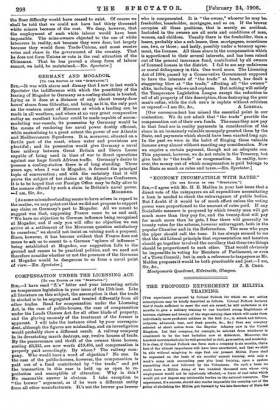COMPENSATION UNDER THE LICENSING ACT.
[To THE EDITOR OF THS "SPECTATOR.".1 have read " Z.'s " letter and your interesting article on temperance legislation in your issue of the 17th inst. Like all literature on this subject, the assumption is that the trade in alcohol is to be segregated and treated differently from all other trades. Read for compensation under the Licensing Act, in the case of public-houses, the case of compensation under the Lands Clauses Act for all other kinds of property, and the glaring anomaly of the treatment of the former is apparent. I will take the instance cited by your correspon- dent, although the figures are misleading, and on investigation would probably show a different result. A railway company in its devastating march destroys, say, twelve houses of trade. By the perseverance and thrift of the owners these houses, costing £3,315, are now worth £19,494, and compensation is properly paid accordingly. By whom ? The railway com- pany. Who would have a word of objection P No one. In the case of the public-houses, however, the compensation is paid out of a fund contributed by "the trade," and yet the transaction in this case is held up as open to re- probation and susceptible of alteration. Why is this P No reasonable answer is obvious. I take exception to "the brewer" argument, as if he were a different entity from all other manufacturers. It,le not the brewer qua brewer who is compensated. It is "the owner," whoever he may be. freeholder, leaseholder, mortgagee, and so on. If the brewer occupies all these positions, that is merely an accident. Included in the owners are all sorts and conditions of men, women, and children. Usually there is the freeholder, then a lessee, probably also a sub-lessee, then mortgagees, sometimes one, two, or three ; and lastly, possibly under a tenancy agree- ment, the licensee. All these share in the compensation which is apportioned to their several interests, and has been raised out of the general insurance fund, contributed by all owners of licensed houses in the district. I fail to see any unfairness or moral delinquency in this. One word more. The Licensing Act of 1904, passed by a Conservative Government supposed to have the interests of "the trade" at heart, has dealt a staggering blow at "the trade," affecting all "the owners" alike, including widows and orphans. But nothing will satisfy the Temperance Legislation League except the reduction to nil of all property of this description, thus destroying the poor man's cellar, while the rich one's is replete without criticism [Our correspondent has missed the essential point in our contention. We do not admit that "the trade" provide the compensation out of their own funds. The sums they now pay to that fund are in reality payments in consideration of the share in an immensely valuable monopoly granted them by the State, and payments which should have been exacted long ago. In the past we were in the habit of flinging these valuable licenses away almost without exacting any consideration. Now we require a certain payment, though not an adequate one. This payment, however, we do not retain in the Treasury, but give back to "the trade" as compensation. In reality, how- ever, the money out of which compensation is paid belongs to the State as much as rates and taxes.—En. Spectator.]










































 Previous page
Previous page